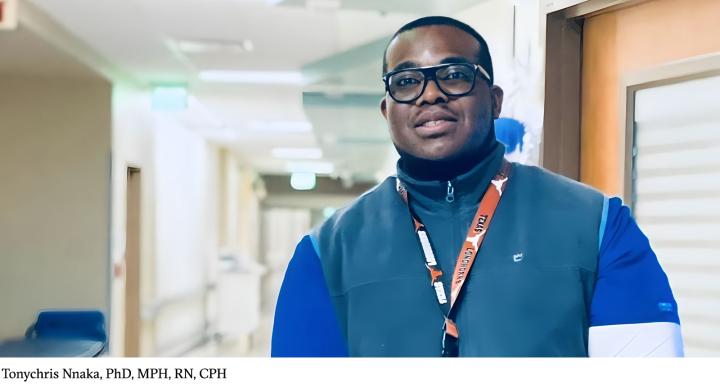
After a tragic incident that Tonychris Nnaka, PhD, MPH, RN, CPH, experienced when he was 8 years old, he decided that whatever he would do in life, it would be related to saving lives and serving the needs of underserved people.
As a PhD student at The University of Texas at Austin School of Nursing, he received world-class doctoral training, guided by experts in his area of research and provided with excellent access to scholarly resources.
As a health disparities and cardiovascular disease researcher, with a focus on the use of technology and digitalized methods for cardiovascular disease prevention and management, Dr. Nnaka felt privileged to have Miyong Kim, PhD, RN, FAAN, FAHA, as his advisor.
Dr. Kim encouraged Dr. Nnaka’s independence as a trainee and assigned him as lead in the development and piloting of clinical trial projects she oversaw. Dr. Nnaka was a predoctoral fellow in the NIH-funded T32 Center for Precision Health Intervention Methodology Training in Self-Management of Multiple Chronic Conditions.
“My supervisor, mentors and faculty pushed and challenged me intellectually,” he said. “In my research lab, under the direct supervision of Dr. Miyong Kim, my peers and I were pushed to go beyond our comfort zone and demand nothing but excellence in all our research activities.”
Working alongside Dr. Kim, the T32 director and the principal investigator for the program, Dr. Nnaka assisted in developing and conducting clinical trials to test the feasibility, acceptability, and efficacy of precision health methods and digitalize intervention approaches for the management of chronic diseases such as high blood pressure and diabetes.
Dr. Nnaka attributes much of his academic success to the support he received from faculty and mentors throughout his academic career.
While completing his undergraduate degree at the University of Texas at Arlington, he was fortunate to be mentored by Michael Young, PhD, FAAHB, FSSSS, FASHA, FAAHE, who served as the Associate Dean for Research in the College of Nursing and Health Innovation.
“His mentorship changed my life,” Dr. Nnaka said. “It made me realize that I didn’t want to simply save lives and serve the needs of my community, but also, I wanted to contribute to discovering ways to holistically enhance the overall health of communities.
“I was quite confident that a career in nursing would allow me to provide holistic service and care for communities, specifically through an approach that goes beyond mere treatment of diseases but rather addresses subliminal factors that influences health.”
Dr. Nnaka described his journey at the UT Austin School of Nursing as an experience he will treasure forever and one that is unmatched.
“Starting from my first semester to my last semester as a doctoral student, I received incredible support from my professors both in class and outside the classroom,” he said. “They recommended me for scholarships and training programs that significantly enhanced my doctoral training experience. Due to these recommendations, I received two major awards for my doctoral training—the T32 Precision Health pre-doctoral fellowship program and the Jonas Philanthropies grant.
“Having these two awards provided me the opportunity to focus primarily on developing my program of research. It gave me the courage to devote much of my time towards attaining one goal, which is learning as much as I could from the expertise of those of my mentors and faculty.”
For Dr. Nnaka, being a nurse means contributing to the greater good of the population and the community—a contribution that goes beyond the bedside.
“Nursing is a rewarding career,” he said. “There are just so many paths to follow. I graduated with my Bachelor of Science in Nursing in 2015. Since my graduation, I worked for several years as a bedside critical care nurse, held nursing management roles, served as health policy advisor to the mayor of one of the largest cities in our nation and now I am about to pursue my ultimate passion as a scientist. If I had been told back in 2015 that I would be exposed to all these incredible life experiences in just seven years, I wouldn’t have believed it.
“My point is that nursing is a profession that can take one to places that one never imagines possible. The role of nurses in the clinical and public health arena is endless. We can go from being at bedside and serving the sick, to being in the community and leading public health efforts, and, frankly speaking, to even potentially functioning as the U.S. Surgeon General or in a presidential cabinet position such as being Secretary of Health and Human Services—leading our nation’s health policy strategies.”
Dr. Nnaka received his PhD in nursing in December 2022. He will join the Geisel School of Medicine at Dartmouth College as a research fellow in their Department of Biomedical Data Science. While at Dartmouth, he will focus on further developing and enhancing his skills in the use of digitalized approaches for managing various types of heart disease.